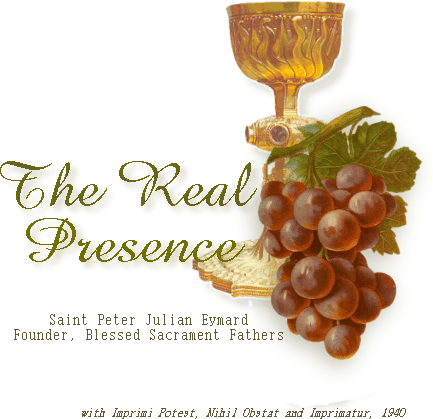 THE GIFT OF THE HEART OF JESUS Si scires donum Dei! If thou didst know the gift of God. (John iv. 10.) JESUS had reached the end of His mortal life. Heaven called back its King. He had battled enough; it was time for Him to triumph. Nevertheless Jesus did not want to abandon His new family, the children He had just redeemed. I go away, and I come unto you, He said to His Apostles. "Thou comest back to us, Thou both remainest and goest away, Lord? But by what miracle of Thy power wilt Thou do this?" That was the secret and the work of His Heart. Jesus would have two thrones, one of glory in Heaven, the other of meekness and goodness on earth; two courts, the triumphant and heavenly court, and the court of the redeemed here below. And, you may be sure, if Jesus could not remain simultaneously in Heaven and on earth, He would prefer to remain with us rather than return to Heaven without us. He has assuredly given abundant proof that He prefers the least of His poor ransomed creatures to all His glory, and that His "delights are to be with the children of men." In what state was Jesus to remain with us? In a transitory state, from time to time? No; He would remain with us in a continuous state, and always. But at this point a wonderful struggle took place in the soul of Jesus. Divine justice protested. Was not the Redemption over and the Church founded? Was not man given possession of grace and of the Gospel, of the Divine law and of the help to keep it? The Heart of Jesus answered that what was enough to effect the Redemption was not enough to satisfy His love; that a mother is not content with giving birth to her child but that she feeds it, brings it up, and follows it everywhere. "I love men more than the best of mothers ever loved her child! I will stay with them . . ." "Under what form?" "Under the veiled form of the Sacrament." Divine majesty objected to such a humiliation, greater than that of the Incarnation, and more self-abasing than the Passion itself: "The salvation of man does not call for such abasement." "But," replied the Sacred Heart, "I want to veil Myself and My glory, lest the splendor of My Person prevent my poor brethren from coming to me as the glory of Moses once did the Jews. I want to throw a veil over My virtues, lest they humiliate man and incline him to despair of ever attaining so perfect a Model. "He will thus come to Me more easily, and, seeing Me stoop down to the very confines of nothingness, he will come down with Me. I will have the right to say to him with more authority: 'Learn of Me, that I am meek and humble of heart.' " What means will Jesus take to perpetuate Himself? The Holy Ghost was the fitting athor of the mystery of the Incarnation; at the Last Supper, Jesus did everything Himself. But who, in the future, would be deemed worthy to preside at such a mystery? A man: the priest! . . . But Divine wisdom objected: "What! A mortal man will effect the Incarnation of his Savior and God? A man will co-operate with the Holy Ghost in this new incarnation of the Divine Word? A man will command the immortal King of ages and will be obeyed?" "Yes," said the Heart of Jesus. "Yes, I will love man to the point of being subject to him in all things. I will come down from Heaven at the call of a priest. I will leave My tabernacle at the least wish of the faithful. I will go through the streets of the city to visit My children on their bed of pain. . . . Love glories in loving, in giving of its own, in sacrificing itself." And the sanctity of God also protested: "But Thou wilt at least be present only in a temple worthy of Thy glory. Thou wilt have priests worthy of Thy kingship. In the New Law everything must be more beautiful than in the Old Law. Only the Christians that are pure and well prepared will receive Thee." "My love," said Jesus, "is without reserve or condition. On Calvary I obeyed My executioners. If other Judases come to Me, I will still accept their diabolical kiss; I will obey them." But what a picture then unfolded itself before the eyes of Jesus! His Heart had to struggle with its own inclinations. The agony of the Garden of Olives was already upon Him. At Gethsemane, Jesus would be saddened unto death at the sight of the ignominies in store for Him in His Passion. He would shed tears of blood at the thought that His people would be lost in spite of His sacrifice. And He would feel cruelly the apostasy of a great number of His own. But now, at the Last Supper, what a struggle went on in the Heart of Jesus! What anguish! He wanted to give Himself in His entirety, without any reserve; but would everybody believe in so much love? Would all those who believe in it receive Him with gratitude? Would all those who receive Him be faithful to Him? The Heart of Jesus was certainly not wavering, nor did it hesitate; but it was tormented. He saw His Passion renewed every day in His Sacrament of love; renewed by Christian hearts, by hearts that were consecrated to Him. He saw Himself betrayed by apostasy, sold by self-interest, crucified by vice. The hearts of those who receive Him become all too often His Calvary. What a torture for this Divine Heart! What was He to do? He would give Himself. He would give Himself just the same.  Contact Us Contact Us HOME---------------THE HOLY EUCHARIST DIRECTORY-----------------------BLESSED SACRAMENT VISITS www.catholictradition.org/Eucharist/real-presence7.htm |